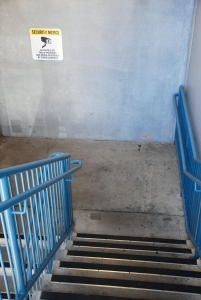In re Worker’s Compensation Claim of Stevens, a workers’ compensation appeal from the Supreme Court of Wyoming, involved claimant who was injured when she fell down a flight of stairs outside her workplace. She worked at an aquatics facility, and the accident occurred in late 2010. After falling down the steps, claimant crawled back into her workplace and was helped by her coworkers.
 Her husband drove her to the hospital that day, and doctors diagnosed her with fractures in one of her fingers and the fifth metacarpal of her left hand. Intake records show she was able to walk, her main complaint was pain in her hand, and she denied any other injuries from the fall.
Her husband drove her to the hospital that day, and doctors diagnosed her with fractures in one of her fingers and the fifth metacarpal of her left hand. Intake records show she was able to walk, her main complaint was pain in her hand, and she denied any other injuries from the fall.
The following day, a surgeon operated on her left hand and noted she had pain in her hand and arm. He prescribed pain medication and saw her during follow-up visits over the next few months.
The day after her surgery, her employer interviewed her about the accident, and she did not report having any pain in her hip at that time. Two days later, she returned to work for a Halloween party. That day, she began to feel pain in her right hip but figured it would go away. A few days later, she went back to her hand surgeon for a follow-up visit, where he noted her hand was healing normally, and there was no mention of any hip pain.
Eight days later, claimant was approved for workers’ compensation benefits for her hand injury. This was a final determination of eligibility for benefits. However, when she went back to her surgeon two weeks later, she told him of her hip pain. He diagnosed her with bursitis and gave her pain medication.
Almost three months after her fall injury, she returned to the hospital complaining of hip pain. Doctors ordered an MRI, and it was revealed she had AVN (death of bone due to lack of blood) and opined that it was cause by trauma associated with her fall accident. Her doctor ordered her to use crutches and come back in six weeks. She was further diagnosed with a fracture in the radial head of hip.
Her application for additional workers’ compensation was denied on grounds the hip condition was not related to her fall. A hearing was held, and a doctor hired by the commission opined that the fall was not the likely cause of her injuries. However, co-workers testified she was pointing to her hip when asked if she had pain anywhere else other than her hand.
Ultimately, the commission denied her claim for benefits, and the court of appeals affirmed the denial, citing hearing officer had sufficient evidence before him when making his decision to deny the claims.
As our Boston on the-job-injury attorneys can explain, one of the best things a claimant can do to maximize the chance for full and appropriate workers’ compensation is to seek representation as soon as possible. It is better to have someone on your side when making any statements about the accident.
If you are injured on the job in Massachusetts, call Jeffrey Glassman Injury Lawyers for a free and confidential consultation to discuss your workers’ compensation claim: (617) 777-7777.
More Blog Entries:
Man Electrocuted in Construction Site Accident, August 25, 2014, Boston Workers’ Compensation Lawyers Blog
 Massachusetts Workers Compensation Lawyers Blog
Massachusetts Workers Compensation Lawyers Blog

